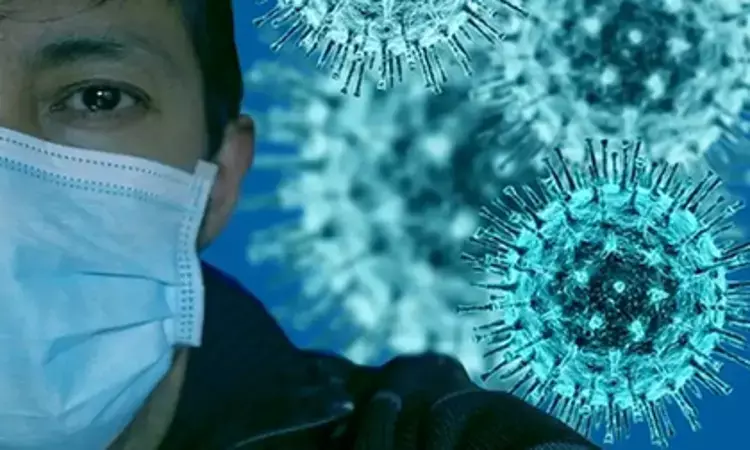- Home
- Medical news & Guidelines
- Anesthesiology
- Cardiology and CTVS
- Critical Care
- Dentistry
- Dermatology
- Diabetes and Endocrinology
- ENT
- Gastroenterology
- Medicine
- Nephrology
- Neurology
- Obstretics-Gynaecology
- Oncology
- Ophthalmology
- Orthopaedics
- Pediatrics-Neonatology
- Psychiatry
- Pulmonology
- Radiology
- Surgery
- Urology
- Laboratory Medicine
- Diet
- Nursing
- Paramedical
- Physiotherapy
- Health news
- Fact Check
- Bone Health Fact Check
- Brain Health Fact Check
- Cancer Related Fact Check
- Child Care Fact Check
- Dental and oral health fact check
- Diabetes and metabolic health fact check
- Diet and Nutrition Fact Check
- Eye and ENT Care Fact Check
- Fitness fact check
- Gut health fact check
- Heart health fact check
- Kidney health fact check
- Medical education fact check
- Men's health fact check
- Respiratory fact check
- Skin and hair care fact check
- Vaccine and Immunization fact check
- Women's health fact check
- AYUSH
- State News
- Andaman and Nicobar Islands
- Andhra Pradesh
- Arunachal Pradesh
- Assam
- Bihar
- Chandigarh
- Chattisgarh
- Dadra and Nagar Haveli
- Daman and Diu
- Delhi
- Goa
- Gujarat
- Haryana
- Himachal Pradesh
- Jammu & Kashmir
- Jharkhand
- Karnataka
- Kerala
- Ladakh
- Lakshadweep
- Madhya Pradesh
- Maharashtra
- Manipur
- Meghalaya
- Mizoram
- Nagaland
- Odisha
- Puducherry
- Punjab
- Rajasthan
- Sikkim
- Tamil Nadu
- Telangana
- Tripura
- Uttar Pradesh
- Uttrakhand
- West Bengal
- Medical Education
- Industry
COVID-19 Infection tied to elevated VTE Risk in Pregnancy and Postpartum period: Study

A new study published in the European Journal of Epidemiology showed that while post-COVID-19 venous thromboembolism (VTE) was rare, the infection significantly increased VTE risk during pregnancy and postpartum, even after adjusting for anticoagulant use. These findings support the need for individualized risk assessment when considering prophylactic anticoagulation in these periods.
Because women undergo hemostatic changes in preparation for delivery, pregnant and puerperal women are more susceptible to venous thromboembolism. Investigating whether COVID-19 infection was linked to VTE during pregnancy or 12 weeks after giving birth while using (prophylactic or therapeutic) anticoagulants was the aim of this study.
All women in Sweden and Norway who gave birth after 22 gestational weeks and whose conception dates were between March 2020 and 2022 were included in this population-based register research. The exposure was a PCR-verified COVID-19 test, and the result was a diagnosis of VTE either during pregnancy or 12 weeks after giving birth. Women who tested negative and those who had never been tested were considered non-infected.
Overall hazard ratios were obtained using Cox regression models, which controlled for maternal factors and anticoagulant usage and included COVID-19 infection as a time-varying exposure. We calculated the time-specific risk of VTE in the first 2, 4, 8, 12, and 16 weeks after COVID-19 infection in order to assess if there was a specific elevated risk of VTE soon after testing positive for the virus.
Of the 323,868 subjects, 80 (0.2%) were diagnosed with VTE, while 46,048 (14.2%) developed COVID-19 during pregnancy. There was a greater incidence of VTE in pregnant women with COVID-19 than in those without the virus (4.9 vs. 2.9/1000 person-years; adjusted overall hazard ratio [aHR] 1.26, 95% Confidence Interval [CI] 0.80-2.00).
Within two weeks of infection, the risk was at its highest (aHR 4.63, 95% CI 2.71–7.90), but it continued to be high for 12 weeks after infection (aHR 1.86, 95% CI 1.17–2.94). Nearly, 6 (0.07%) were diagnosed with VTE during the postpartum period, and 8,515 (2.6%) had COVID-19 (aHR 5.17, 95% CI 2.50-10.69).
Despite the rarity of VTE following COVID-19 infection, the infection was linked to a higher risk of VTE throughout pregnancy and after giving birth, even when anticoagulant usage was taken into account.
Overall, even after controlling for anticoagulants, COVID-19 during pregnancy or the postpartum period was linked to an increased risk of VTE. Even though the absolute risk of VTE was low, these results should help determine each person's risk when determining whether preventive anticoagulants are necessary throughout pregnancy and after giving birth.
Reference:
Örtqvist, A. K., Söderling, J., Magnus, M. C., Urhoj, S. K., Håberg, S. E., & Stephansson, O. (2025). COVID-19 infection increases the risk of venous thromboembolism during pregnancy and the postpartum period. European Journal of Epidemiology. https://doi.org/10.1007/s10654-025-01268-z
Neuroscience Masters graduate
Jacinthlyn Sylvia, a Neuroscience Master's graduate from Chennai has worked extensively in deciphering the neurobiology of cognition and motor control in aging. She also has spread-out exposure to Neurosurgery from her Bachelor’s. She is currently involved in active Neuro-Oncology research. She is an upcoming neuroscientist with a fiery passion for writing. Her news cover at Medical Dialogues feature recent discoveries and updates from the healthcare and biomedical research fields. She can be reached at editorial@medicaldialogues.in
Dr Kamal Kant Kohli-MBBS, DTCD- a chest specialist with more than 30 years of practice and a flair for writing clinical articles, Dr Kamal Kant Kohli joined Medical Dialogues as a Chief Editor of Medical News. Besides writing articles, as an editor, he proofreads and verifies all the medical content published on Medical Dialogues including those coming from journals, studies,medical conferences,guidelines etc. Email: drkohli@medicaldialogues.in. Contact no. 011-43720751


